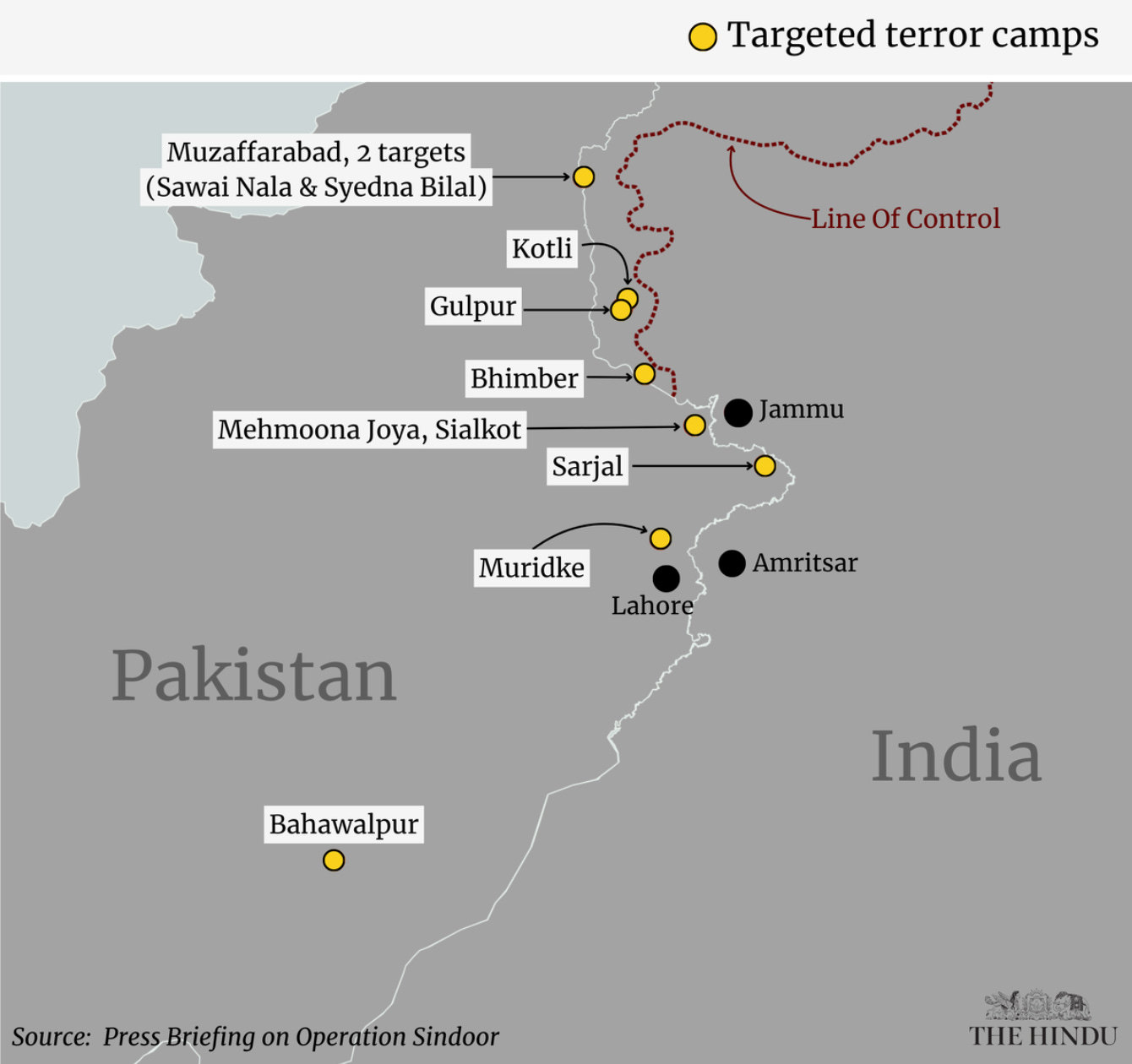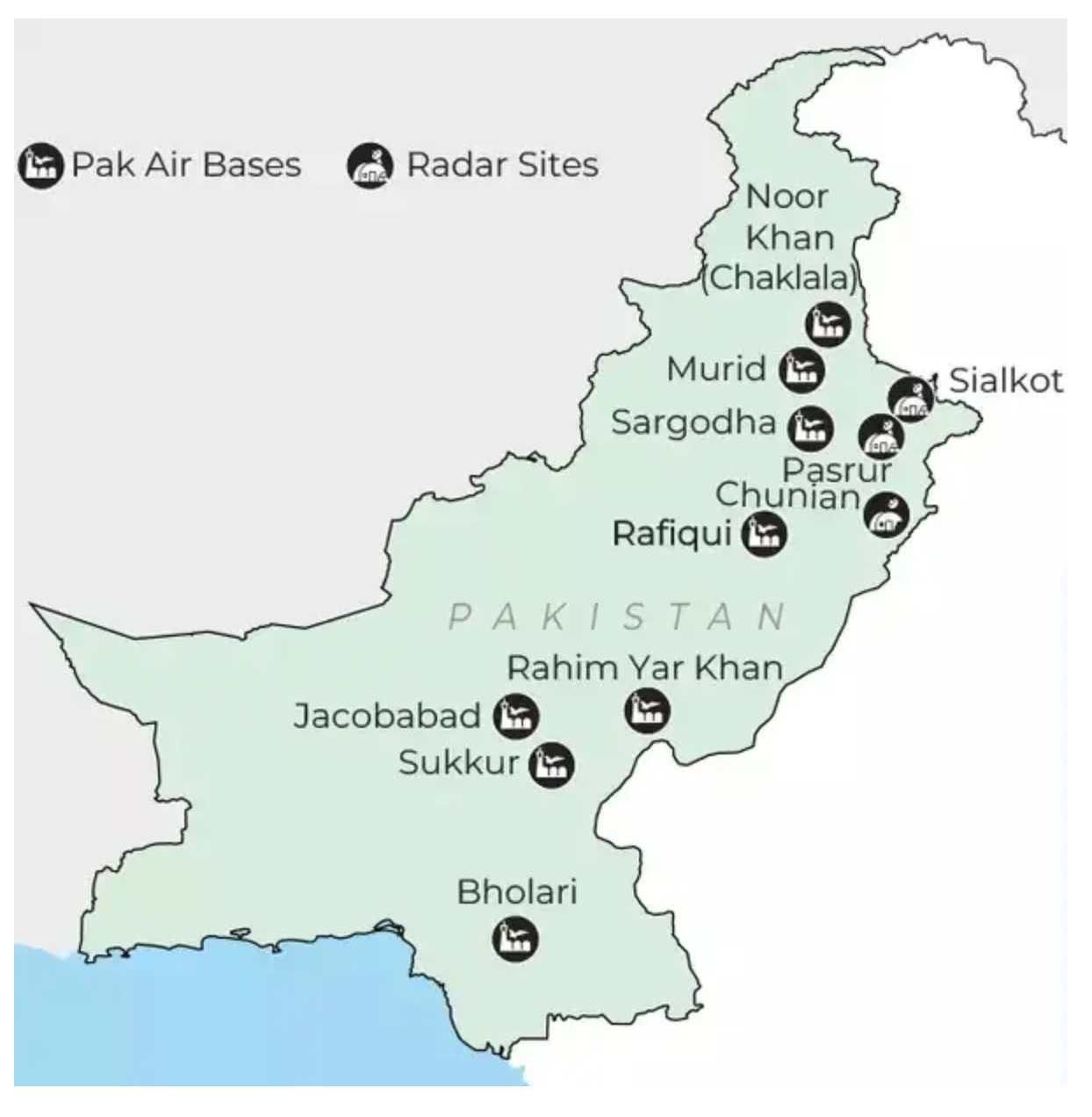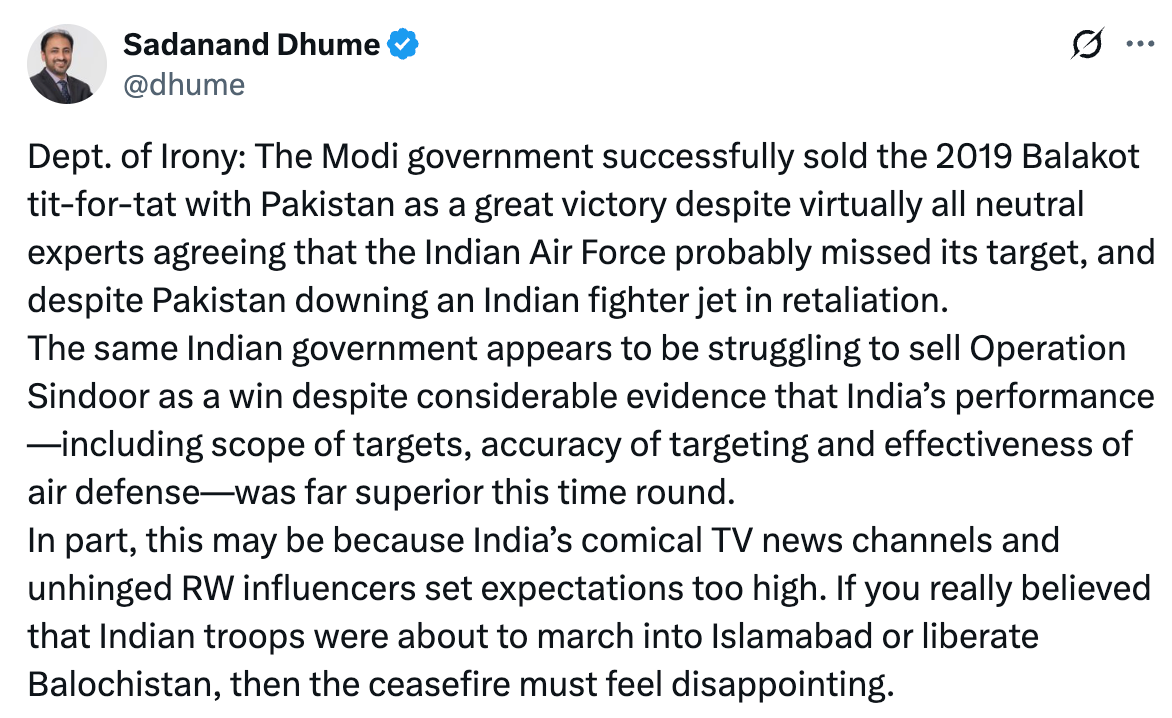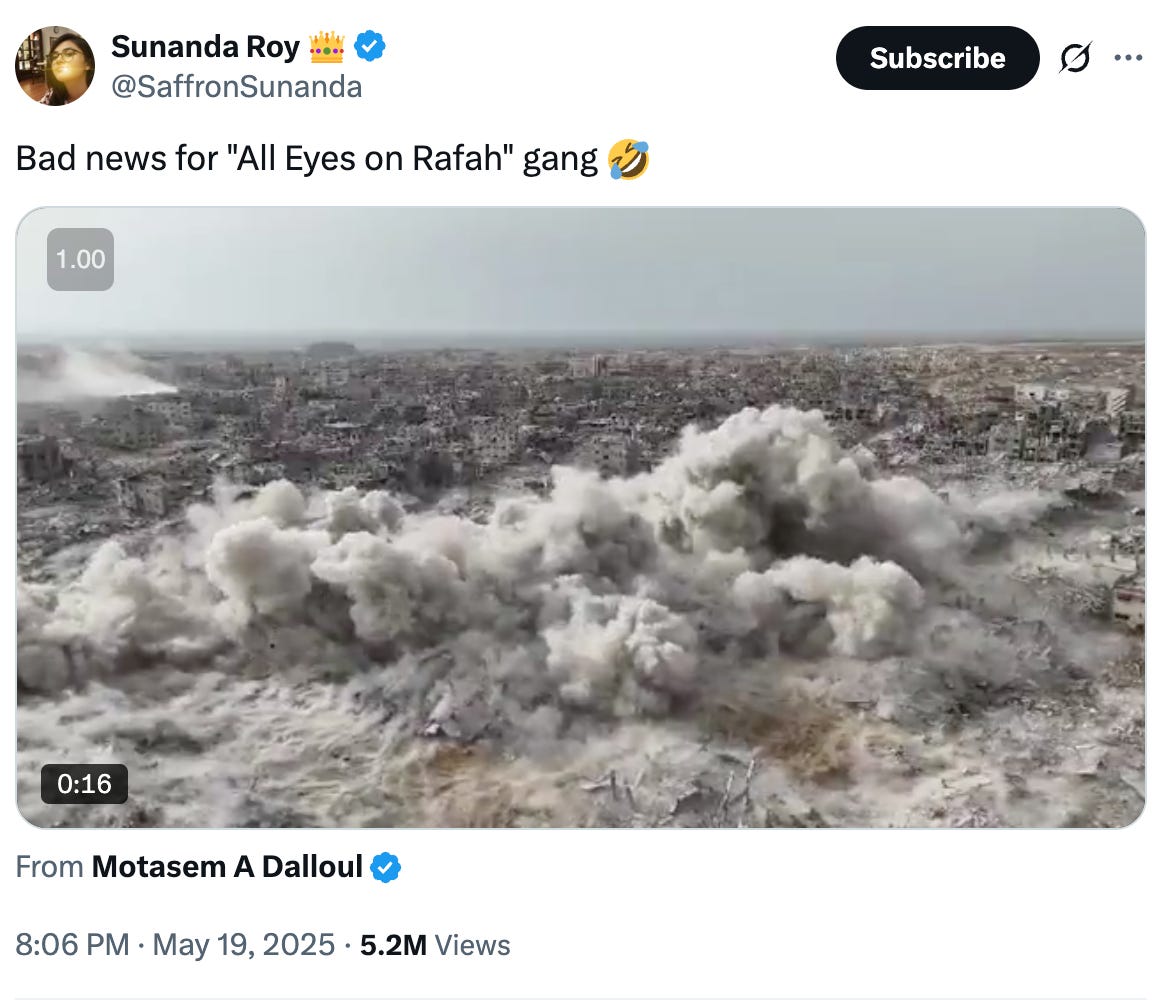#33: The reply guys are a liability
When you don't understand limited objectives, success looks like a failure
Early this month, we were dangerously close to a full-scale war between India and Pakistan. Overt military action seems to be over for now. This is good news for India, as we achieved what we wanted without continuing on the escalation ladder. Yet, if you had opened Twitter on the day of the ceasefire announcement, you would have had the impression that India just lost a war.
Think about this: the Indian forces have come out with flying colours.
We always maintained that Operation Sindoor was targeted against terrorists in response to the Pahalgam attack. It had nothing to do with Pakistan's military and civilian infrastructure. We struck them successfully, with satellite evidence, without loss of personnel.
Pakistan chose to escalate by sending swarms of drones and missiles. The Indian air defence successfully intercepted most of them and protected civilians from the air attacks. Unfortunately, several civilians were killed and wounded due to the shelling near the LOC by Pakistan.
India countered Pakistan’s escalation by hitting Pakistan’s air defence infrastructure. Pakistan again retaliated with drone and missile attacks, which we again largely intercepted. In response, we hit deep inside the Pakistani mainland, targeting some of their most important military bases with satellite imagery proof.
Pakistan’s DGMO contacted the Indian DGMO proposing the ceasefire, which we accepted because that was always our position.

By and large, we came out with tactical and operational disadvantage, as
and explained in their recent episode of The Seen and the Unseen.
If we achieved our objectives, then why was the mood so sour on the day of the ceasefire? I think it is because the reply guys do not understand or care about limited objectives. (Here I am using a broader definition of reply guys as terminally online people on social media who frequently post or respond to posts, with unnecessary, unsolicited, or overconfident comments.)
Dhume perfectly captured this irony:
Punditry has always been farcical because talk is cheap. But the reply guys are even worse, as they lack even the basic baseline knowledge, expertise, or reputational costs of traditional pundits. Most of them are anonymous social media accounts.
There was a time when we were optimistic about ‘seizing the global narrative’ because of the increasing access to the internet in India. But we forgot about our poor human capital1, which severely reduces the quality of discourse. Due to their large numbers, a lot of mainstream media in India caters to this crowd, or perhaps is comprised of people with the same level of intelligence as them.
I am not being snobbish about restricting who can speak. I love the democratisation of discourse. But how do we ensure that the death of gatekeeping does not mean the death of expertise and smartness? You certainly do not want Gabbar Singh to choreograph the response by Indian forces on Twitter2:
You can see how the reply guys are a liability. India went over and beyond to explain that its actions were targeted and non-escalatory; these people cheered the army to ‘repeat 1972’ and occupy large parts of Pakistan. The Indian forces clarified that it is a responsible force and it did not hit any nuclear targets in Pakistan; the reply guys somehow started taking this denial as some form of insinuation that we actually did it (something like “wink, wink, we all know what that means”). Never mind that such a narrative harms India. Why would we do that?
And then, there was a slew of abuses targeted at the Indian Foreign Secretary, who was one of the key faces of communication from the Indian side. They even doxed his daughter. All of this was supposedly because the Foreign Secretary gave a pretty standard response to reports of ceasefire violations by Pakistan, which was not jingoistic enough for this crowd. The loonies think the Foreign Secretary speaks based on vibes without political clearance.
The harm is not limited to this conflict. The reply guys consistently create a bad rap. Even before the Operation Sindhoor, they abused the widow of a Naval Officer who was killed in Pahalgam because “she urged people not to target [ordinary] Muslims or Kashmiris”. For some strange reason, they seem to take great joy in suffering in other places, such as Gaza and Syria.
I was worried that the urge to please the reply guys may push our government into an unnecessarily risky territory. But, kudos to them for acting sensibly and largely ignoring this crowd so far. But for how long? While the government has not fully given in to the reply guys, it has not opposed them strongly enough. For instance, the External Affairs Ministry did not put up a single statement to defend the Foreign Secretary, which was the least it could have done.
The traditional institutions of the knowledge society are deeply broken. We need new spaces for building and nurturing expertise that can represent coherent and informed opinions. In the absence of such institutions, all the voices are basically the same, and the reply guys will continue to dominate the discourse. The problem is not unique to us; audience capture seems worse in the US with MAGA. For instance,
is now banging his head for supporting the right after seeing its low human capital poisoning all the great things about the US.In one of the future editions, I plan to think about levers for the new age agenda setting. What could new (or ‘updated’) institutions be that can build good ideas and crowd out the bad ones? Ideas and thoughts are welcome.
I wrote a draft of this edition a while ago, but could not come back to editing it. In between, Shekhar Gupta wrote an excellent piece that overlaps with many of the ideas in this piece. I highly recommend reading (or watching) it.
Victimhood is compellingly seductive and we have cultivated it into a chronic disease across generations. There are, however, factual problems with this….
Self-pitying victimhood is worse than defeatism in that it also makes you frustrated. The stupidest thing you’ve been hearing lately is, the West (read Washington) has rehyphenated India with Pakistan. Hello, has anybody told you to enter negotiations over Kashmir and offered to mediate? Even Trump’s boasts are about mediating a ceasefire. It’s been nearly six years since India changed the constitutional status of Jammu & Kashmir. No friendly power has objected, asked you to reverse it….
We are an odd people, in fact more the establishment, who hold the western media, NGOs, think tanks, intellectuals, academia in contempt. They are all prejudiced against us. They can’t tolerate the rise of India. They don’t matter. We must carry on regardless. If so, why do we hyperventilate at their criticism and questions. It’s inexplicable and if it wasn’t upsetting our public opinion so much, I’d even call it amusing. We can’t be so contemptuous of Western opinion and yet so angry they don’t understand us.
Over the years, our establishment has stopped engaging with western media, especially those based in India. Most of them have experienced visa struggles, admonished for being “anti-India”. Then we complain they’ve vitiated global opinion against us and send out these 44 MPs on taxpayer-funded summer vacation to undo the damage. We have to first decide if global opinion matters to us or not. If it does, we must drop all ego and bluster and engage with their media, think tanks, civil society. If we don’t, stop this tamasha of MPs going from port to port…
Mahmudabad story made NYT, as indeed a bigger one on the private war run by our commando comic channels that had the Navy finish Karachi, Army capture Islamabad and the IAF obliterate everything in between… All of these have damaged India and turned, very regrettably, India’s soft power into a hard liability.
Recent collection of Tweets:
If you have seen The Dictator movie: Trump’s comment on stealth aircraft.
Hard to believe, but I fully agree with Trump here.
My hypothesis on what might have happened behind the scenes with the US before the ceasefire ‘understanding’ between India and Pakistan: [1], [2].
Recommendations:
[Article] The Average College Student Is Illiterate by Hilarius Bookbinder
[Article] Be Wary of Imitating High-Status People Who Can Afford to Countersignal by Rob Henderson explains why you should not imitate successful people (by whatever definition you choose for yourself). They can do some things precisely because they are successful, but this can be detrimental to someone early in their journey.
[Article] The Palestinian Fetish by Lucy Tabrizi: a good explainer on the history of Israel-Palestine. I agree with much of the commentary on the Palestinian activists, who completely suck in my opinion. However, that is a much smaller problem compared to the incredible cruelty being unleashed by thug Netanyahu.
[Blog] DolphinGemma: How Google AI is helping decode dolphin communication by Google. I plan to do a full edition dedicated to how amazing Google is, the Bell Labs of our times.
[Video] How Sikkim became an Indian state & Indira Gandhi's Himalayan borderlands plan by Shekhar Gupta
[Video] Sanjeev Bikhchandani’s conversation with Prakhar Gupta: some good career and life advice here.
[Video] Wide Putin Walking but every time he turns he gets wider
[Article] Orders for Pahalgam satellite images from US firm peaked two by months before attack by Soumya Pillai: a rear piece of ‘real’ journalism from Indian media.
If you follow me on Twitter, you will know that I now blame most of our problems on our poor human capital.
I rarely dunk on people, but all of this was too annoying and probably harmful to ignore.







Love this post - deeply dislike the reply guys and gals. Very informative! All your suggested articles pointed me to great sources. Been at this since the past hour. Look forward to more on the Google post! In awe with your writing style - so simple, concise and easy to understand.